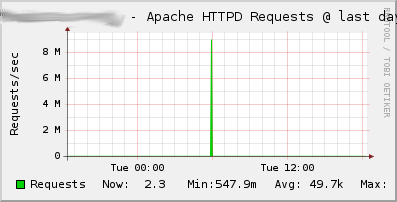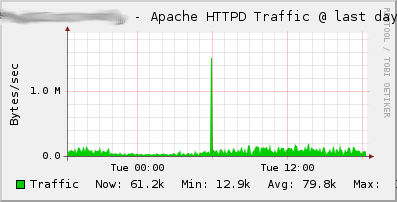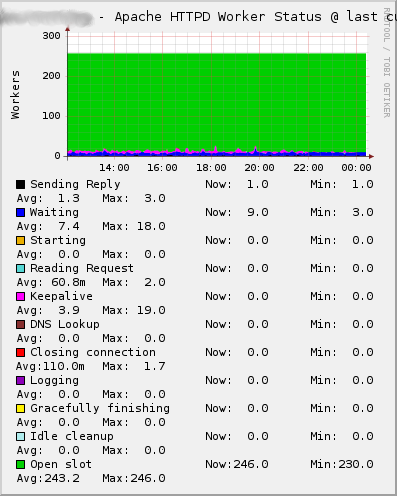2013-07-02 // AIX RPMs: AWStats, ganglia-addons-httpd, httpd and mod_perl
Following up to the previous posts, regarding the topic of AIX RPM packages, here are four new AIX RPM packages from the webserver and webserver monitoring category:
AWStats: AWStats is a open source logfile analyzer which can parse and process a number of popular logfile formats and generate graphical reports from the information gathered.
In order to run AWStats on a host, you need to edit the configuration files in
/opt/freeware/etc/awstats/according to your needs and environment. To perform regular updates on the generated statistics, a cronjob – preferably with use of the run_parts wrapper – should be set up. E.g. for an statistics update every ten minutes:8,18,28,38,48,58 * * * * /opt/freeware/libexec/run_parts/run-parts -x /opt/freeware/share/awstats/tools/update.sh
ganglia-addons-httpd: A Ganglia addon to gather performance metrics from the Apache webserver via the Apache
mod_statusmodule. The packageganglia-addons-httpd-scriptsis to be installed on the host running the Apache webserver. It depends on theganglia-addons-basepackage, specifically on the cronjob (/opt/freeware/etc/run_parts/conf.d/ganglia-addons.sh) defined by this package. In the context of this cronjob all avaliable scripts in the directory/opt/freeware/libexec/ganglia-addons/are executed. For this specific Ganglia addon, the Apache configurationmod_statusneeds to be enabled:$ a2enmod status Enabling module status. Run '/etc/rc.d/init.d/httpd restart' to activate new configuration
and the module option set to
ExtendedStatus On:- /opt/freeware/etc/httpd/mods-enabled/status.conf
<Location /server-status> SetHandler server-status Order deny,allow Deny from all Allow from 127.0.0.1 ::1 </Location> # Keep track of extended status information for each request ExtendedStatus On
After those changes the Apache processes need to be restarted:
$ apachectl -t Syntax OK $ /etc/rc.d/init.d/httpd restart
The package
ganglia-addons-httpdis to be installed on the host running the Ganglia webinterface. It contains templates for the customization of the Apache metrics within the Ganglia Web 2 interface. See theREADME.templatesfile for further installation instructions. Here are samples of the three graphs created with those Ganglia monitoring templates:httpd: A slightly modified version of Michael Perzls Apache packages. The packaging has been done in a different way, so that the different MPMs as well as their development files are part of different sub-packages, which can be installed seperately. The contents of the configuration directory
/opt/freeware/etc/httpdare modeled closer to the setup one usually finds on current Debian Linux distributions, namely with the subdirectoriesconf.d,mods-available,mods-enabled,sites-availableandsites-enabled. “mods” (modules) and “sites” are enabled by symlinking the respective files from themods-availableandsites-availabledirectories into the directoriesmods-enabledandsites-enabled. The commandsa2enmod,a2dismod,a2ensiteanda2dissiteknown from current Debian Linux environments have been added to ease the job of creating and removing the necessary symlinks.To run a at least minimal httpd setup, you need to enable some modules after installing the RPM packages:
$ for MOD in alias authz_host log_config log_io mime; do a2enmod ${MOD}; done Enabling module alias. Run '/etc/rc.d/init.d/httpd restart' to activate new configuration! Enabling module authz_host. Run '/etc/rc.d/init.d/httpd restart' to activate new configuration! Enabling module log_config. Run '/etc/rc.d/init.d/httpd restart' to activate new configuration! Enabling module log_io. Run '/etc/rc.d/init.d/httpd restart' to activate new configuration! Enabling module mime. Run '/etc/rc.d/init.d/httpd restart' to activate new configuration! $ apachectl -t Syntax OK $ /etc/rc.d/init.d/httpd start
mod_perl: Basically the same as Michael Perzls mod_perl package, but build with the IBM XL C/C++ compiler against the Perl package provided here: AIX RPMs: Perl and CPAN Perl Modules. Thus it does not need libgcc to be installed.
2012-07-21 // Apache Logfile Analysis with AWStats and X-Forwarded-For Headers
When running a webserver behind a (reverse) proxy or load-balancer it's often necessary to enable the logging of the original clients IP address by looking at a possible X-Forwarded-For header in the HTTP request. Otherwise one will only see the IP address of the proxy or load-balancer in the webservers access logs. With the Apache webserver this is usually done by changing the LogFormat directive in the httpd.conf from:
LogFormat "%h %l %u %t \"%r\" %>s %O \"%{Referer}i\" \"%{User-Agent}i\"" combined
to something like this:
LogFormat "%{X-Forwarded-For}i %l %u %t \"%r\" %>s %O \"%{Referer}i\" \"%{User-Agent}i\"" combined
Unfortunately this solution fails if your so “lucky” to have a setup where clients can access the webserver both directly and through the proxy/load-balancer. In this particular case the HTTP request of the direct access to the webserver has no X-Forwarded-For header and will be logged with a “-” (dash). There are some solutions to this out on the net, utilizing the Apache SetEnvIf configuration directive.
Since this wasn't really satisfying for me, because it prevents you from knowing which requests were made directly and which were made through the proxy/load-balancer, i just inserted the X-Forwarded-For field right after the regular remote hostname field (%h):
LogFormat "%h %{X-Forwarded-For}i %l %u %t \"%r\" %>s %O \"%{Referer}i\" \"%{User-Agent}i\"" combined
An example of two access log entries looks like this:
10.0.0.1 - - - [21/Jul/2012:18:32:45 +0200] "GET / HTTP/1.1" 200 22043 "-" "User-Agent: Lynx/2.8.4 ..." 192.168.0.1 10.0.0.1 - - [21/Jul/2012:18:32:45 +0200] "GET / HTTP/1.1" 200 22860 "-" "User-Agent: Lynx/2.8.4 ..."
The first one shows a direct access from the client 10.0.0.1 and the second one shows a proxied/load-balanced access from the same client and the proxies/load-balancers IP address 192.168.0.1.
Now if you're also using AWStats to analyse the webservers access logs things get a bit tricky. AWStats has support for X-Forwarded-For entries in access logs, but only for the example in the second code block above as well as the mentioned SetEnvIf solution. This is due to the fact that the responsible AWStats LogFormat strings %host and %host_proxy are mutually exclusive. An AWStats configuration based on the Type 1 LogFormat like:
LogFormat = "%host %host_proxy %other %logname %time1 %methodurl %code %bytesd %refererquot %uaquot"
will not work, since %host_proxy will overwrite %host entries even if the %host_proxy field does not contain an IP address, like in the above direct access example. The result is a lot of hosts named “-” (dash) in your AWStats statistics. This can be fixed by the following simple, quick'n'dirty patch to the AWStats sources:
- awstats.pl
diff -u wwwroot/cgi-bin/awstats.pl.orig wwwroot/cgi-bin/awstats.pl --- wwwroot/cgi-bin/awstats.pl.orig 2012-07-18 19:28:59.000000000 +0200 +++ wwwroot/cgi-bin/awstats.pl 2012-07-18 19:30:52.000000000 +0200 @@ -17685,6 +17685,18 @@ next; } + my $pos_proxy = $pos_host - 1; + if ( $field[$pos_host] =~ /^-$/ ) { + if ($Debug) { + debug( + " Empty field host_proxy, using value " + . $field[$pos_proxy] . " from first host field instead", + 4 + ); + } + $field[$pos_host] = $field[$pos_proxy]; + } + if ($Debug) { my $string = ''; foreach ( 0 .. @field - 1 ) {
Please bear in mind that this is a “works for me”TM kind of solution, which might break AWStats in all kinds of other ways.






